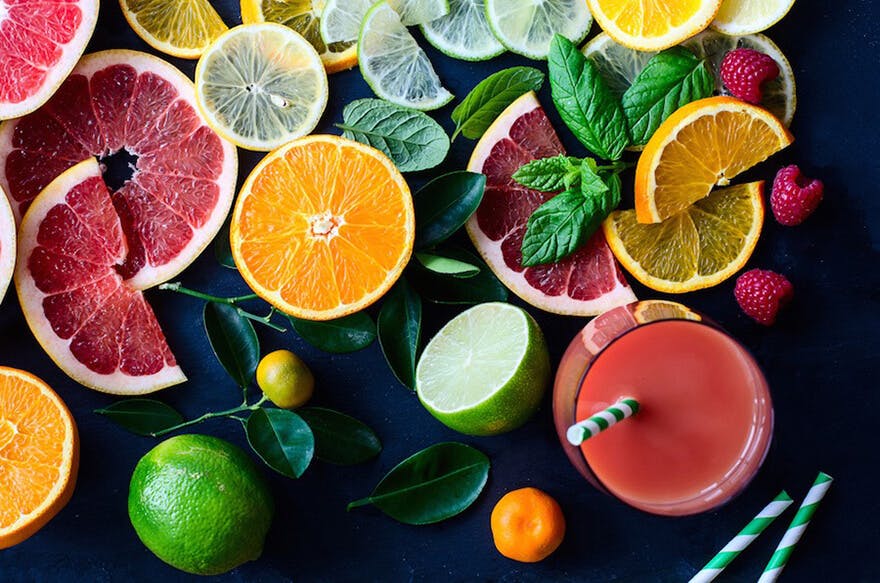How Do Vitamins Work?
VITAMINS & MINERALS
05.30.2014

Vitamins help us with all the inner workings of the body. They regulate the billions of chemical activities that occur in the body every minute of every day.1
Whether it's being able to see at night2 or nourish our skin,3 they assist us with the biological processes that make life possible. Think of them as a 24/7 construction or maintenance crew that helps us to work, grow, and develop properly. While vitamins might not take the spotlight as the crew chief, the various jobs our bodies need to do would not be possible without their help.
Ideally, we get the vitamins we need from the foods we eat.4 In the body, proteins, carbohydrates, and fats combine chemically with other substances to provide energy and build body tissue. Enzymes produced from specific vitamins, initiate or accelerate these chemical reactions.5, 6 For example, the B vitamins help with the formation of active enzymes that help transfer energy from the food we ingest to the body.7
All vitamins have different jobs to do. While vitamins can have very specific tasks, they often work as a team regulating the various biological processes within our bodies.8,9
How vitamins are actually used and processed by the body depends on their chemical makeup. Vitamins are either water-soluble (such as vitamin C and the B vitamins) or fat-soluble (A, D, E, and K). Water-soluble vitamins are absorbed by the intestine and carried by our blood to specific body tissues where they are needed. Water soluble vitamins such as B2, are easily lost through sweat and urine. Consequently, they must be replenished more often. Fat soluble vitamins on the other hand, can take quite a while to break down and remain in the body longer. Vitamins, like A and D, get stored in the liver while vitamin E is stored in body fat.10, 11, 12
There are 13 essential vitamins we all need to grow and function on a daily basis. Here is a brief summary for some of the tasks these “essentials” are responsible for within our body.10, 11, 12
Vitamin A helps form and maintains healthy teeth, bones, soft tissue, mucous membranes, and skin.10, 11, 12
Vitamin B6 helps break down proteins, helps maintain normal nerve function and form red blood cells.10, 11, 12
Vitamin B12 is essential for metabolism. It also helps form red blood cells and maintains the central nervous system.10, 11, 12
Vitamin C promotes the health of teeth and gums as well as wound healing.10, 11, 12
Vitamin D helps the body absorb calcium, which is important for healthy teeth and bones. It also helps maintain proper blood levels of calcium and phosphorus.10, 11, 12
Vitamine E is an antioxidant that plays a role in the formation of red blood cells.10, 11, 12
Vitamin K is required for normal coagulation of the blood. Some studies suggest that it helps maintain bone health in the elderly.10, 11, 12
Biotin is essential for the metabolism of proteins and carbohydrates, and in the production of hormones and cholesterol.10, 11, 12
Niacin helps maintain healthy skin and nerves. It also has cholesterol-lowering effects.10, 11, 12
Folate works with vitamin B12 to help form red blood cells. It is also necessary for the production of DNA which controls tissue growth and cell function.10, 11, 12
Pantothenic acid is essential for the metabolism of food. It is also plays a role in the production of hormones and cholesterol.10, 11, 12
Riboflavin (B2) works with the other B vitamins. It is important for body growth and the production of red blood cells.10, 11, 12
Thiamine (B1) helps the body’s cells change carbohydrates into energy. It is also essential for heart function and healthy nerve cells.10, 11, 12
If you’re not sure whether you’re getting all the essential vitamins you need every day from your diet, consult with a nutritionist or your doctor, and consider the added benefits of taking a daily multivitamin.
1 http://www.umaine.edu/wellness/nutlinks.htm
2 http://www.nlm.nih.gov/medlineplus/vitamins.html
3 http://www.nlm.nih.gov/medlineplus/ency/article/002399.htm
4 http://www.nlm.nih.gov/medlineplus/ency/article/002399.htm
5 http://themedicalbiochemistrypage.org/vitamins.html, Michael W. King, Ph.D / IU School of Medicine
6 http://www.ncbi.nlm.nih.gov/bookshelf/br.fcgi?book=stryer&part=A1088
7 http://www.ncbi.nlm.nih.gov/bookshelf/br.fcgi?book=cooper&part=A279
8 http://www.lifeclinic.com/focus/nutrition/nutritionview.asp?artId=973
9 http://www.fda.gov/forconsumers/consumerupdates/ucm118079.htm
10 Chemical Composition of Everyday Products by John Toedt, Darrell Koza, Kathleen Van Cleef-Toedt, pp. 124 - 126
11 http://www.ext.colostate.edu/pubs/foodnut/09315.html
12 http://www.nlm.nih.gov/medlineplus/ency/article/002399.htm
Image Credits: saschanti17/Shutterstock.com
Recommended Articles
The 5 Best Foods That Will Help Supercharge Your Brain
Amidst our busy schedule, it's important to retain our focus and memory. Resting alone is not...
Iron deficiency is a lot more common than you would think. A recent survey by SATA CommHealth(i...
Mars vs Venus: Understanding the His and Hers of Nutritional Needs
Mars vs Venus: Understanding the His and Hers of Nutritional Gaps Although their DNAs are...






